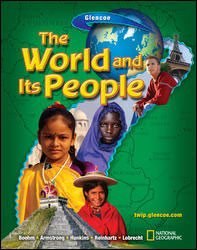
The World and Its PeopleChapter 12: Western Europe TodayChapter OverviewsThe United Kingdom is made up of four regions—England, Scotland, Wales, and Northern Ireland—and is a major industrial and trading country. It is a parliamentary democracy as well as a constitutional monarchy, and about 90 percent of its people live in cities and towns. Known as the Emerald Isle because of its green meadows and trees, the Republic of Ireland is a country with a growing economy. France is the largest country in western Europe. Agriculture and manufacturing are the major economic activities. In fact, France produces more food than any other nation in Europe. Belgium, the Netherlands, and Luxembourg are known as the Benelux countries. Belgium's location has made it an international center for trade. The Netherlands is one of the most densely populated countries in the world. High technology makes its small farms very productive. Luxembourg, one of the smallest countries in Europe, is home to many multinational companies. Germany is a global economic power and a leader in the European Union. Although the two parts of Germany were reunited in 1990, the eastern region still lags behind the western region economically. The Alps form most of the landscape in Switzerland, Austria, and Liechtenstein. Although it has few natural resources, Switzerland is a thriving industrial nation. Austria's economy is strong and varied. Norway, Sweden, Finland, Denmark, and Iceland make up the region of Scandinavia. North Sea oil and gas have made Norway a wealthy nation, and Sweden also is a wealthy industrial country. With its thick forests, Finland is a major producer of wood and paper products. Denmark lies on a peninsula known as Jutland and the 500 islands that surround it. With some of the richest farmland in Scandinavia, Denmark exports many agricultural products. Because of its location on top of a fault in the North Atlantic, Iceland is a land of hot springs and geysers. The country's economy depends heavily on fishing. Spain and Portugal occupy the Iberian Peninsula. Although agriculture is still important to Spain and Portugal, most people now work in manufacturing and service industries. The boot-shaped Italian peninsula extends out from Europe into the center of the Mediterranean Sea. Northern Italy holds much industry and attracts tourists. The capital city of Rome was once the heart of the Roman Empire. Greece lies on the southern tip of the Balkan Peninsula and the 2,000 islands surrounding the mainland. Shipping and tourism are vital to Greece's economy. |  |















